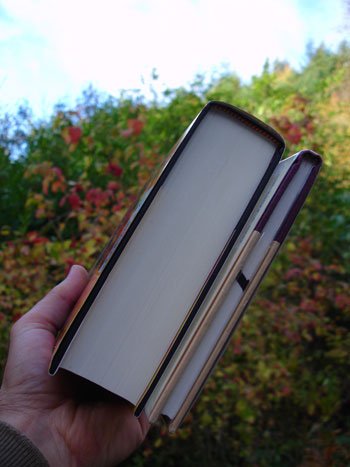the vanishing thickness of books

[update: been meaning to put a link to this Robert McCrumb article in the Guardian that seems to agree with my thoughts in this post.]
A few days ago I discovered that the book I’m currently working on (working title: Matryoshka) is not in fact a novel, but rather a novella. Initially I was rather dismayed. After some investigation I realized that of course it was a novella – not only because it is going to be less than the 50000 words that (apparently) marks the boundary between novella and novel, but because it is a novella – look at this definition from mantex.co.uk:
The essence of a novella is that it has a concentrated unity of purpose and design. That is, character, incident, theme, and language are all focussed on contributing to a single issue which will be of a serious nature and universal significance.
What I am working on fits this description pretty snugly. Of course, this should not have been that much of a revelation since I’ve recently been rather fixated by – well – novellas, d’oh!
The reason I was dismayed is because it seems that mainstream publishers don’t much like publishing novellas. Once upon a time they did (The Time Machine, Death in Venice, Heart of Darkness) but in these more commercially-fixated times, they don’t. This seems to be because there are minimal costs associated with publishing any book and so a novella probably has to be charged at the same rate. Someone picking up two books that are almost the same price, but one is sliver-thin, and the other thick enough to prop a door open (a joke made to me often about my own books – and a not unreasonable point – after all, a student riot should be able to see off even the best armed police with a few volleys of my books *grin*).
An aspect of ‘physicality’ is that it finds a different, perhaps more instinctive, way into our brains. For example, when I see a time such as 2:36pm on a digital display I always think – oh, that’s only 20 minutes away – so it is really 3pm and there’s no point in starting anything new (this mostly happens when I’m working…). However, if I see the same time displayed on a clock face, it suddenly looks much more like half an hour before 3 and that’s plenty of time to do something. 2:36 is a virtual form of the time, and we can easily play games with virtual things. A clock face is like looking at a sliced up cake – and the size of a wedge of cake is not something I for one ever make mistakes about!
Anyway, my core point is that once books move into a virtual form on an ebook – then their thickness will vanish into abstraction. Of course the number of pages will still be displayed for a book – but this is just one number versus another – not something you can ‘feel’. and this on a plethora of devices with different numbers of pixels, where the font size can be modified according to the preferences of the reader – all of which will change the number of pages that any book will span in the device. It seems to me likely that other aspects of the book will come to dominate the mind of the reader.
It seems to me that we are on the verge of a renaissance in shortforms. We are all so busy these days and there is so much out there to tempt us and to consume, that naturally people are gravitating to art that can be quickly and intensely enjoyed. Though I’m sure there will always be time for more leisurely pleasures, as with the ‘album’ in music – an artistic form dictated by the capacity of a standard vinyl disk – once freed of physical constraints, an artistic ‘object’ can find its own natural size and form. For me such a day of liberation cannot come soon enough.